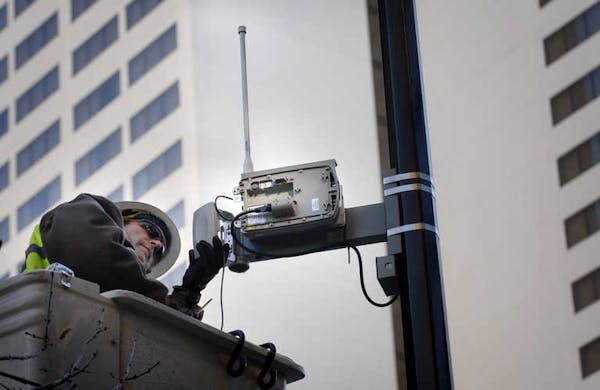St. Louis Park had once praised Arinc Inc. as an innovator -- a company bold enough to build the nation's first citywide wireless Internet service powered by the sun.
Now, it's taking the company to court.
The city has filed a lawsuit in Hennepin County alleging that Maryland-based Arinc failed to deliver a working Wi-Fi network. It is seeking judgments in the amount of the project's contract -- $1.7 million -- from Arinc and Federal Insurance, the company that guaranteed Arinc's performance, as well more than $50,000 in damages and attorneys' fees.
The suit is a bitter end to the city's often-strained 18-month relationship with the company.
In late 2006, St. Louis Park selected Arinc to build its much-heralded, long-researched Wi-Fi network -- largely because Arinc, the low bidder, had proposed making it solar-powered.
But after multiple delays and concerns about performance, the city found Arinc to be in default of that contract in December 2007. The two sides had been attempting to negotiate a settlement since.
"We just couldn't come to an agreement," said City Attorney Tom Scott. "It's unusual to get to this point."
In those negotiations, the city requested that Arinc give back the $414,000 the city had paid already, as well as remove $1 million worth of Wi-Fi equipment it had installed which the city says doesn't work well.
Arinc spokeswoman Linda Hartwig defended the company's work, saying it has met its contractual obligations.
"We will vigorously defend our position," she said by e-mail. She declined to comment further.
In a December letter to the city, Arinc's Ruth Hough, vice president of network solutions, said the city's decision to declare the company in default was "premature."
The company pointed to issues outside its control, such as network interference, to explain why the network did not function ideally in some locations. And it noted that one six-week delay occurred because the city, not Arinc, chose to pause the project. The company proposed that damages to the city be set at $1,000 a day, capped at $100,000 -- something city staff called "very lacking."
With or without Arinc's help, the city will begin removing the network's solar panels and radios this month, said City Manager Tom Harmening.
Dealing with the 490 poles that hold up that equipment will be trickier, he said.
"It's not a simple matter of just pulling them out," Harmening said. "They're buried in concrete for a reason."
A month after directing staff in January to abandon the radios, solar panels and poles erected for the network, the City Council decided to pause before making any decisions about Wi-Fi in the future.
In testing what Arinc had built, the city found that small portions of the network provided reliable, high-speed connections. But other, larger portions did not.
City staff have said they believe the technology can work -- that the problem was in the implementation. But some council members are concerned, still, about whether solar power is realistic.
"They felt they needed to take a step back, gain some perspective and, in about a year, discuss it again with fresh eyes," Harmening said.
"What will happen next winter? I don't know."
Jenna Ross • 612-673-7168

Trail section at one of Minnesota's most iconic spots closing for rehab

Will 'shotgun only' zone for deer in southern Minnesota be abolished?

Four Minnesotans catch salmonella in outbreak linked to basil sold at Trader Joe's

